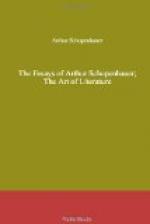There are critics who severally think that it rests with each one of them what shall be accounted good, and what bad. They all mistake their own toy-trumpets for the trombones of fame.
A drug does not effect its purpose if the dose is too large; and it is the same with censure and adverse criticism when it exceeds the measure of justice.
The disastrous thing for intellectual merit is that it must wait for those to praise the good who have themselves produced nothing but what is bad; nay, it is a primary misfortune that it has to receive its crown at the hands of the critical power of mankind—a quality of which most men possess only the weak and impotent semblance, so that the reality may be numbered amongst the rarest gifts of nature. Hence La Bruyere’s remark is, unhappily, as true as it is neat. Apres l’esprit de discernement, he says, ce qu’il y a au monde de plus rare, ce sont les diamans et les perles. The spirit of discernment! the critical faculty! it is these that are lacking. Men do not know how to distinguish the genuine from the false, the corn from the chaff, gold from copper; or to perceive the wide gulf that separates a genius from an ordinary man. Thus we have that bad state of things described in an old-fashioned verse, which gives it as the lot of the great ones here on earth to be recognized only when they are gone:
Es ist nun das Geschick der Grossen
fiier auf Erden,
Erst wann sie nicht mehr sind; von uns
erkannt zu werden.
When any genuine and excellent work makes its appearance, the chief difficulty in its way is the amount of bad work it finds already in possession of the field, and accepted as though it were good. And then if, after a long time, the new comer really succeeds, by a hard struggle, in vindicating his place for himself and winning reputation, he will soon encounter fresh difficulty from some affected, dull, awkward imitator, whom people drag in, with the object of calmly setting him up on the altar beside the genius; not seeing the difference and really thinking that here they have to do with another great man. This is what Yriarte means by the first lines of his twenty-eighth Fable, where he declares that the ignorant rabble always sets equal value on the good and the bad:
Siempre acostumbra hacer el vulgo necio
De lo bueno y lo malo igual aprecio.




